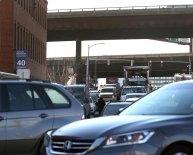
Massachusetts car insurance Laws
Massachusetts follows a "no-fault" car insurance system, and state laws require drivers to carry certain types and minimum amounts of auto insurance. In this article, we'll explore the key components of Massachusetts's car insurance regulations.
No-Fault Car Insurance in Massachusetts
Massachusetts is a "no-fault" state when it comes to auto insurance. This means that when an accident causes injuries, each person files a claim with his or her own insurance company for personal injury protection (PIP) and other benefits.
Typically, drivers in a no-fault state like Massachusetts cannot take one another to court for costs associated with the crash, unless certain conditions are met. In Massachusetts, the thresholds that let drivers step outside of the no-fault system and hold another driver liable for a car accident are:
- the injured person must have incurred at least $2, 000 in reasonable medical expenses, and/or
- injuries resulting from the accident must include permanent and serious disfigurement, fractured bone, or substantial loss of hearing or sight.
Massachusetts Auto Insurance Requirements
Vehicle owners in Massachusetts are required to have an auto insurance policy that provides, at the very least, the following coverage:
- $20, 000 for any one person's injuries in a crash,
- $40, 000 for each accident where more than one person is injured,
- $5, 000 for property damage in each accident, and
- $8, 000 for personal injury protection (PIP) benefits per accident.
PIP benefits pay for the policyholder's own medical bills if he or she is injured in a crash. Some policies also apply PIP benefits to anyone in the policyholder's vehicle and/or the policyholder's dependents. Injury liability amounts cover losses if a seriously injured driver sues the policyholder, as does the $5, 000 in property damage liability coverage.
A driver who wants insurance coverage that will pay for repairs or replacements for his or her own damaged vehicle must buy additional coverage, known as collision (for accidents involving another vehicle) and comprehensive (for accidents involving weather, animals, or objects). Collision and comprehensive aren't required in Massachusetts, but many drivers choose this kind of supplemental coverage to provide additional protection if their vehicle is damaged or destroyed in a crash.
Uninsured/Underinsured Motorist Coverage Not Required in Massachusetts
Massachusetts law does not require drivers to purchase uninsured/underinsured motorist coverage. This insurance pays additional PIP and other benefits if the at-fault driver doesn't have enough insurance to cover all the costs of the accident. (More information: Uninsured/underinsured motorist insurance coverage.)
Massachusetts Auto Insurance Plan (MAIP)
The Massachusetts Auto Insurance Plan (MAIP) is a government insurance program that provides coverage for drivers who have not been able to find insurance in the regular market. An insurance agent can submit an application to MAIP on the driver's behalf after trying and failing to find insurance for the driver through normal channels. MAIP policyholders are assigned randomly to an insurer who is licensed to do business in Massachusetts, and that insurer must provide coverage in most cases. More information about the MAIP is available in these FAQ from the Massachusetts Office of Consumer Affairs and Business Regulation.
Share this article
Related Posts
1 Comments
While researching auto transport quotes, remember that most of them are not provided by actual carriers, but rather by brokers and companies called lead providers. Working directly with a carrier may have its advantages, but contacting a broker will save you lots of time and provide greater choice.
















